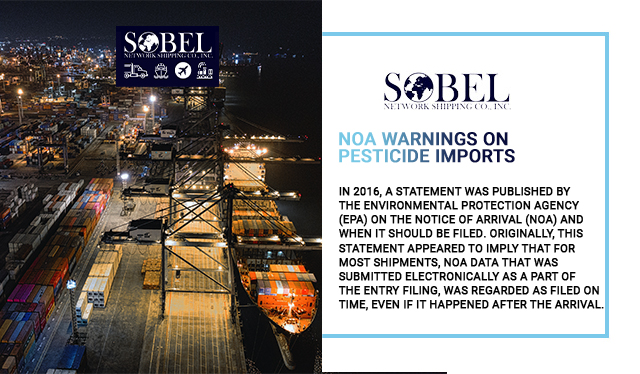In 2016, a statement was published by the Environmental Protection Agency (EPA) on the Notice of Arrival (NOA) and when it should be filed. Originally, this statement appeared to imply that for most shipments, NOA data that was submitted electronically as a part of the entry filing, was regarded as filed on time, even if it happened after the arrival of the shipment. Such was the belief of most customs brokers for the past six years.
Now, the same customs brokers are receiving penalty notices and or warnings from the EPA stating they failed to give a NOA prior to arrival “for pesticides and pesticide devices (such as air filters or UV light units)”. The EPA states the trade has misinterpreted the Interim Regulation, and insists that the NOA data must be submitted before it arrives.
“19 CFR 12.112(a) requires an importer or the importer’s agent desiring to import pesticides or devices into the United States to submit, prior to arrival of the shipment in the United States, a Notice of Arrival of Pesticides and Devices on EPA Form 3540-1 or its electronic equivalent via the Automated Commercial Environment (ACE). Filings for most entry types can be accomplished through ACE,” states the EPA website on the matter. It also adds that under normal circumstances these NOAs are mailed to their designated EPA Import Coordinator, but that they will continue to accept them via email. Should this change in the future, there will be a seven day notice on the site prior to them canceling a temporary process.
Customs and Border Protection (CBP) will be publishing a final rule in the upcoming months to clear up any misunderstandings.
The NCBFAA sent a letter to the EPA that was followed up by three meetings, where they explained the actual application of creating a NOA prior to the date it arrives and incidents that could potentially prevent the entry from being filed priorly. Though the EPA seemed to comprehend more thoroughly the problems customs brokers face in these situations, they didn’t appear to have any near-term solutions for the issue, according to the NCBFAA.
The EPA is claiming to only issue penalties for repeat offenders, however the NCBFAA has yet to confirm this statement.
The late penalties from the EPA can be expensive. Here at Sobel, we advise clients to proceed with the following steps as listed on the NCBFAA website:
- Ensure that the entry and NOA data for pesticides/pesticide device shipments are transmitted to CBP prior to arrival (EPA has not defined what “prior to” means).
- Provide good descriptions for disclaims.
- EPA advises that for recurring products, an estimated quantity can be provided, with an update submitted later, as long as the estimated quantity does not exceed the actual quantity.
- If hit with a penalty, check to see if the “late” NOA filings were or were not “habitual.” Also confirm the actual arrival date used by CBP. The EPA routinely uses estimated dates of arrival, which may vary widely from the actual date. These and other mitigating factors should be included.
As this continues to progress, Sobel is here to keep an eye on how this will affect you and your cargo. Should you have any questions, please do not hesitate to contact your Sobel representative today and find out more.


